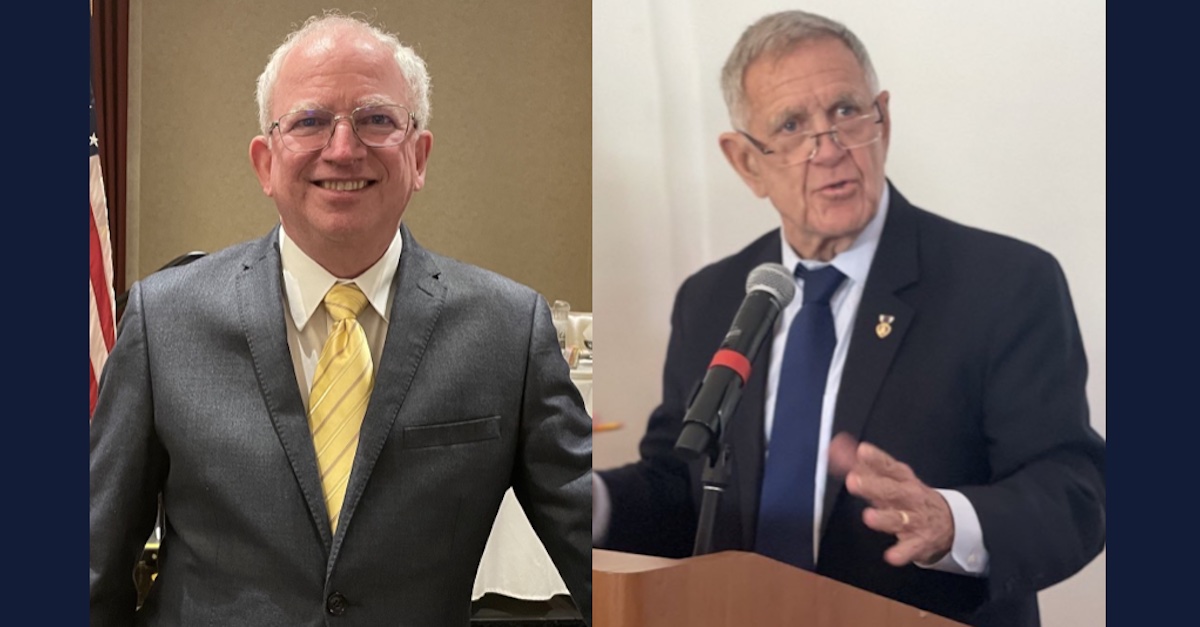
(l-r) John Eastman and U.S. District Judge David O. Carter (photos by Meghann M. Cuniff/Law&Crime)
UPDATE: Judge Carter rejected Eastman’s request on Friday, and Eastman filed a notice of his appeal to the U.S. Court of Appeals for the Ninth Circuit shortly after. In his six-page order, the judge said Eastman “does not carry his burden of showing a likelihood of success on the merits, because the contents of the affidavit do not alter the Court’s conclusion.”
“Eastman’s affidavit presents no evidence that the Court ‘manifestly failed’ to consider when ruling that the crime-fraud exception applies,” the judge wrote. Read the full order here.
Eastman’s motion was filed eight days after Carter ordered 33 documents from Eastman’s Chapman University account to be released to the Jan. 6 Committee. The emails were among 562 Carter reviewed at the committee’s request, and they’re to be the final batch of Eastman’s Chapman emails the judge will review since the unusual case opened in January.
Original story appears below.
—
Former President Donald Trump’s election lawyer John Eastman is asking a California federal judge to reconsider his ruling that Trump knowingly filed false numbers regarding voter fraud, submitting a sealed email record that he says “clearly shows that the President’s lawyers took great care to ensure all court filings were accurate.”
In a 10-page motion filed Thursday, Eastman’s lawyer Charles Burnham asks U.S. District Judge David O. Carter to reconsider his Oct. 19 order that the crime-fraud exception applies to several privileged emails because Trump knew numbers regarding voters fraud “were wrong but continued to tout those numbers, both in court and in the public.” Carter also concluded that some emails “make clear that President Trump filed certain lawsuits not to obtain legal relief, but to disrupt or delay the January 6 congressional proceedings through the courts,” which Burnham’s filing said is not true.
“Dr. Eastman submits that the full email record demonstrates that the legal filings were all designed to obtain a ruling from the court on the contested election challenges,” according to the motion.
Burnham filed a sealed affidavit identifying documents Carter has already reviewed “explain the true import of the email record surrounding the Presidential certification submitted” in Trump’s federal lawsuit in Georgia. He said the affidavit and referenced documents “clearly show that no false information was knowingly submitted by the President or his attorneys, and that the complaint was not filed for an improper purpose.”
Carter had already drawn broad attention for a March 28 order in which he first applied the crime-fraud exception to emails be deemed privileged as attorney work product or attorney-client communications, saying Trump and Eastman “more likely than not” committed obstruction of an official proceeding and conspiracy to defraud the United States by trying to derail electoral vote certification on Jan. 6. His June 7 order and the ensuing release of the emails also revealed Eastman’s communications with Ginni Thomas, wife of U.S. Supreme Court Justice Clarence Thomas, whose name the judge ordered remain unredacted. Carter followed up the order by reclassifying 10 of the 159 emails as privileged at Eastman’s request, citing clerical errors and oversights.
But the Oct. 19 order had its own thunderous reception, drawing widespread news coverage because of Carter’s finding that Trump knowingly touted false voter fraud numbers in and out court.
“The emails show that President Trump knew that the specific numbers of voter fraud were wrong but continued to tout those numbers, both in court and to the public,” Carter wrote. He added in a footnote: “In an attempt to disclaim his responsibility over the misleading allegations, President Trump’s attorneys remove the numbers from the body of complaint (but nonetheless incorporate them by reference) and add a footnote that states President Trump is only relying on information that was provided to him. But, by his attorneys’ own admissions, the information provided to him was that the alleged voter fraud numbers were inaccurate.”
Trump named 78-year-old Carter in an Oct. 20 Truth Social post that called the veteran jurist, who is a former homicide prosecutor and U.S. Marine Corps veteran with a Purple Heart and Bronze Star from the Vietnam War, a “partisan hack.”
“Who’s this Clinton appointed ‘Judge,’ David Carter, who keeps saying, and sending to all, very nasty, wrong, and ill-informed statements about me on rulings, or a case (whatever!), currently going on in California, that I know nothing about — nor am I represented,” Trump wrote. “With that being said, please explain to this partisan hack that the Presidential Election of 2020 was Rigged and Stolen. Also, he shouldn’t be making statements about me until he understands the facts, which he doesn’t!”
A 1999 Bill Clinton appointee, Carter unsuccessfully campaigned for the Democratic nomination for a U.S. House of Representatives seat in 1986 while an Orange County Superior Court judge.
He and Trump have a key connection: Trump’s former national security adviser Robert O’Brien is close friends with the judge. They twice traveled to Afghanistan a few years ago for their work on the U.S. State Department’s Public-Private Partnership for Justice Reform, and O’Brien told a reporter in 2020, “No one promotes the law or American values overseas better than Dave does.”
Carter has years of international judging experience and regularly holds judiciary and counter-terrorism training sessions in countries around the world through the U.S. State Department, U.S. Department of Justice and United Nations.